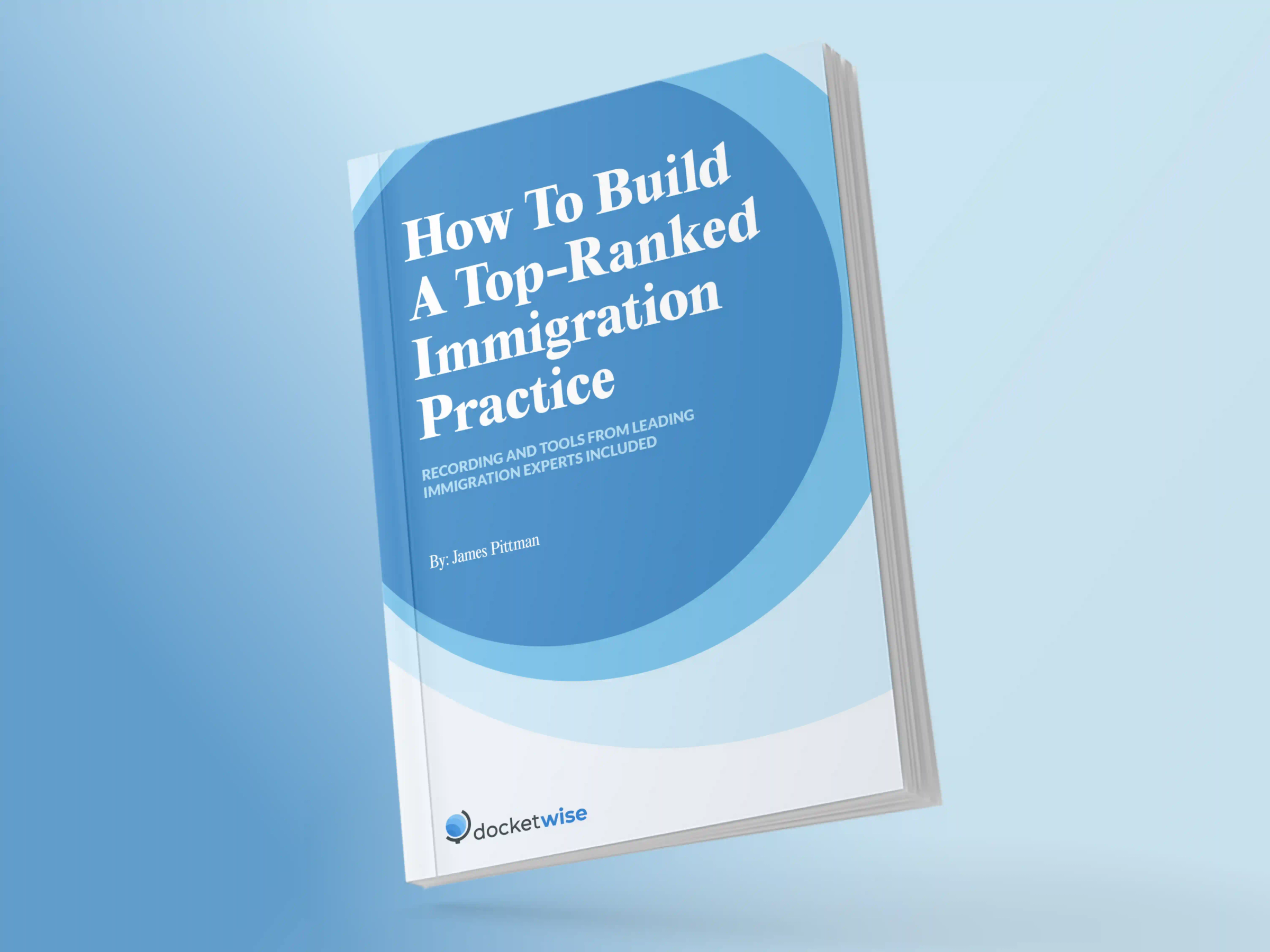Building client trust is crucial for an attorney, especially in immigration law. A trusting relationship ensures that clients feel secure sharing personal and sensitive information and have confidence in the attorney's abilities to handle their cases competently and with care.
What are some actionable ways for immigration attorneys to earn trust and deliver a more client-centric experience? Tsui Yee, the owner of Yee Immigration and a top-rated immigration lawyer, sat down with James Pittman, attorney, and Chief Product Architect at Docketwise, to discuss this topic on the podcast Immigration Uncovered.
Below, we’ll share highlights from their discussion, explore the challenges you’ll face in establishing confidence with the people you serve, and share actionable steps to set a strong foundation with your clients. Let’s dive in.
Why Is It Important To Build Trust as an Immigration Lawyer?
Yee emphasizes, "When a client decides to hire you, that means that they’re placing a huge, tremendous amount of trust in you, and it’s not something I take lightly."
Immigration cases can determine a person’s ability to stay in a country, reunite with family, or avoid deportation. Clients need to believe their attorney is not only knowledgeable but also genuinely concerned about their well-being and future. Trust helps alleviate some of the emotional burdens clients carry, knowing they have a dependable advocate on their side.
Challenges With Building Client Trust as an Immigration Lawyer
Forming any trust-filled relationship takes time and effort. Some of the common hurdles immigration lawyers face when fostering a client-attorney relationship include:
1. Complex and Uncertain Legal Landscape
Immigration laws and policies frequently change, leading to uncertainty and confusion for clients. Clients may also struggle to understand complex legal terminology and procedures, causing them to feel overwhelmed and anxious. As an attorney, you must stay updated on the changing legal landscape and convey information clearly and accurately to reassure your clients.
2. High Emotional Stakes for Clients
Immigration cases often involve significant emotional stress, as clients' lives and futures are directly impacted.
Pittman highlights this: “There’s so much at stake for one thing. You know, a lot of my immigration clients are facing extremely stressful situations. Many of them are fighting deportation, so I take my role as the attorney really seriously.”
3. Misinformation and Scams
Clients often encounter misinformation about immigration processes or can be misled by non-legal advisors or scams. These experiences can lead to understandable skepticism and caution and may require you to work harder to establish credibility and earn trust with clients.
4. Cultural and Language Barriers
Communication can be difficult if clients are not fluent in your native language or come from different cultural backgrounds. Cultural differences can affect clients' expectations and understanding of the legal process, which means being culturally sensitive and aware is a must.
How to Build Trust With Immigration Clients
Taking a few thoughtful steps can help create strong client relationships. Consider implementing the following tips in your law firm:
1. Communicate Consistently and Transparently
Transparent communication is vital for building client trust. Clear, honest, and consistent communication helps alleviate client anxieties, and setting realistic expectations about outcomes and timelines ensures clients are well-informed and not misled.
Tsui Yee explains her approach: “I try to always make sure that my clients trust me by being as open and honest as possible about everything about their case.”
2. Maintain Confidentiality and Privacy
Legal and ethical obligations require attorneys to maintain confidentiality when discussing clients. Demonstrating respect for privacy helps to create trust, especially in immigration cases where sensitive personal information is involved.
James Pittman advises against revealing details about your clients, particularly in online discussions, as there could be repercussions that impact the case or compromise your client’s trust. “It's better to talk somewhat vaguely and in generalities rather than say, for example, an El Salvadoran middle-aged female who lives in this neighborhood. I mean, that's too much information right there.”
Tip: Discover 6 Client Confidentiality Best Practices for Immigration Lawyers here.
3. Stay Reliable and Accountable
Reliability in small actions builds trust. Being available and responsive to your clients’ questions, meeting deadlines, and keeping promises are all crucial. These small actions add up and let clients know that they can count on you—in every way.
In fact, the American Bar Association's Rule 1.4 outlines the importance of communication: “A lawyer should promptly respond to or acknowledge client communications.”
Tsui Yee emphasizes the importance of this, stating, “If they cleared their calendar, made it a point to get to my office on time, and they booked to see me at 3 p.m., I will see them at 3 p.m. To me, that's very important. It's being respectful of other people's time.”
4. Pursue Cultural Competency
Understanding your clients' cultural backgrounds and experiences is vital for building trust. Cultural sensitivity helps avoid miscommunications and foster better client relations.
As Pittman says, “You must be culturally competent as an immigration lawyer, and you have to be the kind of person who can negotiate these cultural gaps because they will come up.”
Tsui Yee shares her experience: “Like some of the cultural norms within certain geographical areas—there definitely have been some times where communication styles were not the same or were a little unexpected. I think what I've learned is to be respectful and open-minded.”
5. Provide Emotional Support
Recognizing and addressing the emotional needs of clients while balancing professional distance is crucial. James Pittman advises, “It's really important to be empathetic, to be compassionate to clients. But you have to be careful about overstepping your role as the attorney there.”
Ultimately, you are operating as an attorney and not a psychologist, psychiatrist, social worker, or counselor. You may consider advising clients to seek out help from these professionals if needed.
6. Be Transparent About Fees and Billing
Clear and upfront communication about legal fees and expenses prevents misunderstandings. Tsui Yee highlights the importance of transparency, stating, “I try to be as clear as possible in my engagement letter. I am specific as to the scope of legal services.”
Offering multiple payment options and flexible payment plans that fit your client's needs can also help build trust.
7. Educate and Empower Clients
Educate clients about the process, including what is expected of them, the next steps, and timelines. This can help them feel involved and in the know.
Tsui Yee explains, “I’ve also shared with my clients very simple instructions on how they can look up the case status themselves, giving them a sense of agency so they don’t have to rely on their attorney for every little bit of news about their case.”
Bonus: For tips on meeting and exceeding client expectations, check out 7 Ways to Master Client Expectations for Immigration Law Firms.
Tips for Maintaining Competency and Expertise
Staying up-to-date with the latest immigration laws and policies will help you be on top of your game and reinforce trust. Clients want to know they are in capable and competent hands. Your awareness and expertise of law and policy changes and technology trends is part of why they hired you and could make the difference between a client getting their desired outcome or not.
For this reason, investing in continuing Legal Education (CLE) courses, participating in social media and online groups, seeking out personal mentorship, and learning professional organizations are valuable resources to help you build and maintain your trust with clients.
Continuing Legal Education (CLE)
Participating in CLE programs is essential for immigration attorneys to keep their knowledge current. These programs offer courses on new laws, regulations, and best practices. Engaging in regular CLE courses helps you stay informed about changes in immigration policies and enhances your ability to provide accurate advice to clients. Many professional organizations, such as the American Immigration Lawyers Association (AILA), offer extensive CLE opportunities tailored to immigration law.
Bonus: Staying current on your CLEs is easy with free courses from our sister company, LawPay. Check them out here.
Social Media and Online Groups
Social media platforms and online groups provide valuable resources for immigration attorneys. These platforms allow you to connect with peers, share experiences, and discuss recent developments in immigration law. Being active in these communities also helps to stay informed about the latest trends and strategies, fostering a collaborative environment.
According to Tsui Yee, “There are various Facebook groups that provide real-life examples of cases that have worked.”
Personal Mentorship
Mentorship plays a crucial role in an attorney's professional growth. Experienced attorneys can offer guidance, support, and insights based on their years of practice. Seeking mentors and being open to learning from their experiences can help you and your team navigate complex cases and develop specialized skills.
Tsui Yee emphasizes the importance of this, saying, "Finding mentors is essential. If I am taking on a case that I’m not very familiar with, I try to see if I can find a mentor or co-counsel who will work with me on that particular case."
Professional Organizations
To further your education and learn from other professionals in your field, consider joining professional organizations like the American Immigration Lawyers Association (AILA). These organizations provide access to a wealth of resources, including legal publications, networking events, and specialized training.
Professional organizations often host conferences and seminars where attorneys can learn about the latest legal developments, connect with fellow practitioners, and engage with the broader legal community.
Tsui Yee highlights the supportive nature of immigration attorneys and the advantages of collaborating with colleagues. She states, "The immigration bar is extremely friendly and willing to share. And, there are a lot of attorneys who have developed a niche practice. So if I am taking on a case that I'm not very familiar with, I would try to see if I can find a mentor or counsel who will work with me on that particular case."
Use Software to Help Build Client Trust
Practice management software is essential for immigration lawyers aiming to enhance client relationships and build trust. Docketwise, for instance, incorporates the following features:
1. Secure Client Portal
Docketwise offers a secure client portal where a client can upload documents, view case updates, and communicate with their attorney securely. This transparency and ease of access help build trust by keeping clients informed and engaged in their cases.
2. Fast and Secure Payments
Handling payments efficiently and securely is a significant aspect of client trust. Docketwise integrates with LawPay, the leader in legal payments trusted by over 150,000 legal professionals, to enable fast and secure payments and ensure that clients can easily pay their legal fees online. This reduces the administrative burden on both clients and attorneys, making the payment process smooth and transparent.
3. Bank-grade Encryption and Distributed Infrastructure
Security is paramount when handling sensitive client information. Docketwise protects your clients’ data using bank-grade encryption and distributed infrastructure. This level of security reassures clients that their personal information is safe, further building trust in the attorney-client relationship.
Tip: For information on practicing data privacy within the realms of AI in your immigration law firm, reference this article.
These capabilities not only streamline administrative tasks but also foster a sense of security and reliability among clients. By utilizing Docketwise immigration legal practice management (LPM) software, firms like yours can demonstrate their commitment to protecting sensitive information and providing a seamless, transparent client experience—thereby strengthening trust and loyalty.
Conclusion
Building and maintaining client trust is essential for immigration attorneys. By focusing on transparent communication and utilizing reliable advanced practice management software like Docketwise, your law firm can foster strong, trusting relationships with your clients. See the Docketwise difference for yourself with a custom demo today.
For a deeper dive into building client trust, listen to the full podcast episode of Immigration Uncovered.
Unlock Your Success as an Immigration Lawyer.
Download Now
About the author
Mary Elizabeth Hammond is a Senior Content Strategist and Blog Specialist for Docketwise, a leading professional business solution. She covers emerging legal technology, financial wellness for law firms, the latest industry trends, and more.

